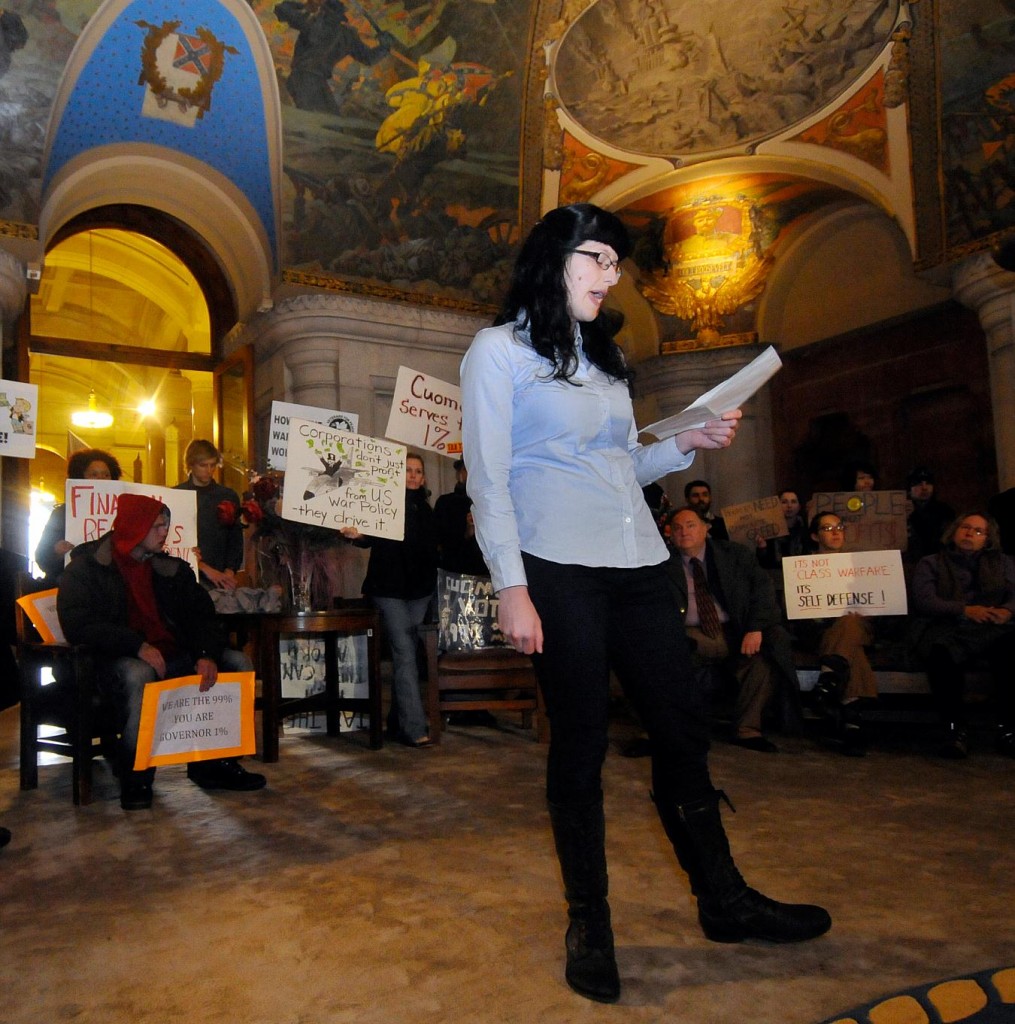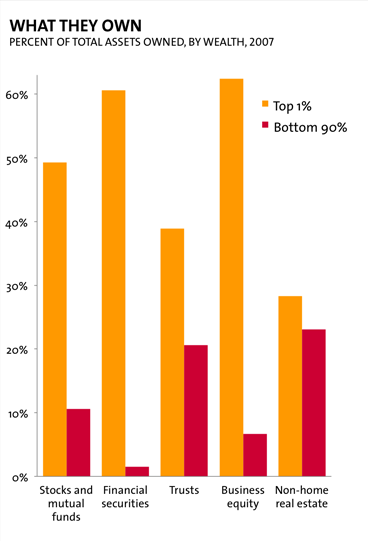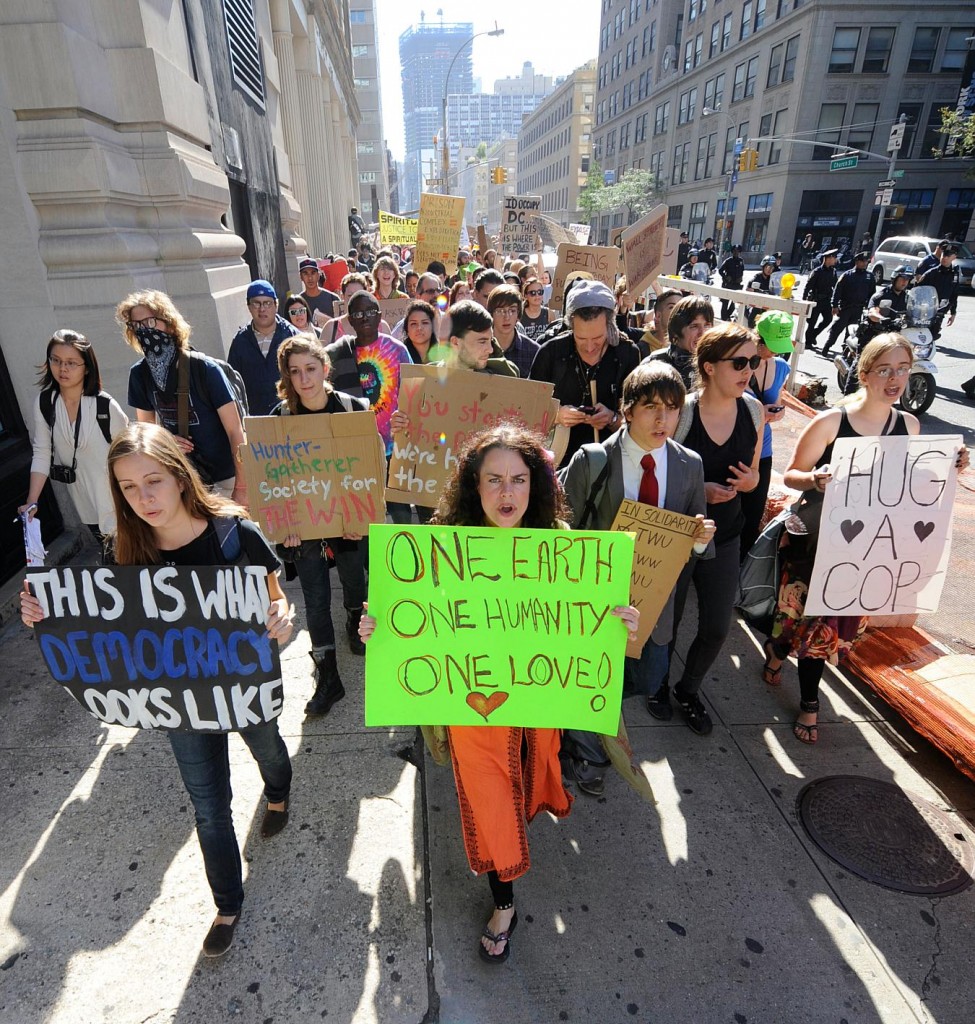httpv://www.youtube.com/watch?v=Kpr537nMD1Q
OWS Declaration of Occupation: “There is no hierarchy.” The declaration was crafted at a general assembly of all those who wished to participate. It is being recited here by means of the “human microphone,” passed through repetition from the front of the crowd to the back.
*
[W]e are all anarchists, wanting the society that interferes least with individual freedom. (“Herbert Read’s The Innocent Eye,” CW 11, 115)
*
Democracy is anarchistic in the sense that it is an attempt to destroy the state by replacing it with an expanding federation of communities, a federation which reaches its limit only in a worldwide federation. (“The Analogy of Democracy,” CW 4, 271)
*
[T]he residual anarchism at the heart of the Romantic movement is still with us, and will be until society stops trying to suppress it. (“Yorick: The Romantic Macabre,” CW 17, 125)
*
[C]ultural developments are quite different from political or economic ones, which not only centralize but become more uniform as they grow. . . If we try to unite a political or economic with a cultural one, certain pathological developments, such as fascism or terroristic anarchism, are likely to result. (“Myth as the Matrix of Literature,” CW 18, 306)
*
[T]he art that emerges under the cultural anarchy of democracy may be subtle, obscure, highbrow, and experimental, and if a good deal of art at any time is not so, the cultural achievement of the country is on the Woolworth level. But art under dictatorship seldom dares to be anything but mediocre and obvious. (“War on the Cultural Front,” CW 11, 186)
*
Through all the confusion and violence of the late 1960s, the thing that anarchism most wants, the decentralizing of power, has been steadily growing. It will continue to grow through the 1970s, I think, in many areas. For example, the possibilities of cable for breaking into the monologue of communications and giving the local community some articulateness and sense of coherence are enormous. And as real decentralization grows and we get nearer to what is called participatory democracy, the false forms of it, separatism, neo-fascism, the jockeying of pressure groups, and all the other things that fragment the social vision instead of diversifying it, will, I hope, begin to break off from it. (“The Quality of Life in the ’70s,” CW 11, 294)
*
When the Korean war began, I wrote in my diary that just as the first half of the 2oth c. saw the end of fascism, so 2000 would see the end of Communism. I was whistling in the dark then, because the Communists had just taken over China. But now I really begin to feel that I’m living in a post-Marxist age. I think we’re moving into something like an age of anarachism: the kind of violence and unrest going on now in China, in the city riots (which are not really race riots: race hatred is an effect of them but not a cause of them) in America, in Nigeria, in Canadian separatism — none of this can be satisfactorily explained in Marxist terms. Something else is happening. . .
There were always two sides to anarchism: one a pastoral quietism, communal (Anabaptist, Brook Farm) or individual (Chaplinism). Its perfect expression, in an individual form, is Walden, in a communal form, News from Nowhere. The beats & hippies with their be-ins and love-ins, the “Dharma bums,” are the faint beginnings of a new pastoralism. The hysterical panic about organization, full employment, keeping the machines running, & the like, is now waning as it becomes possible to do other things that work. The hippies only seem to be parasitic, but the fact of voluntary unemployment, of a cult of bums, is new. In the depression the statement “these people just don’t want to work” was the incantation of the frivolous, trying not to think seriously. But now there are such people, and the values they challenge are equally bourgeois and Marxist values.
The other side was violence & terror, without aim & without direction, like the rioting sweeping the world from Canton to Detroit, Lagos to Amsterdam. These riots are local & separatist: they have no intelligible point or aim; they simply show the big units of society breaking down. They aren’t poor against rich, young against old, or black against white; they’re just the anxiety of destruction against the anxiety of conservation. (“Notebook 19,” CW 9, 98-9)
*
Frye: There are other things in the Canadian tradition that are worth thinking about. Thirty years ago [in the 1930s] the great radical movement was international Communism, which took no hold in Canada at all. There were no Marxist poets, there were no Marxist painters… The radical movement of our time is anarchist and that means that it’s local and separate and breaks down into small units. That’s our tradition and that’s our genius. Think of Toronto and Montreal (I know Toronto better than Montreal, but I think the same is true of both cities): after the Second World War, we took in displaced persons from Europe to something like one-quarter to one-fifth of the population. In Toronto in 1949, one out of every five people had been there less than a year. We have not had race riots, we have not had ethnic riots, we have not had the tremendous pressures and collisions that they’ve had in American cities. Because Canada is naturally anarchist, these people settle down into their own communities; they work with other communities and the whole pattern of life fits it. I do think we have to keep a very wide open and sympathetic eye towards radical movements in Canada, because they will be of the anarchist kind and they will be of a kind of energy that we could help liberate.
Chiasson: How do you explain materially the fact that there is not a serious breakdown in the country if the base is anarchist?
Frye: Well, I think that the ideal of anarchism is not the shellfish, the carapace, the enclosed, isolated group. It’s rather the self-contained group and feels itself a community and because it’s a community it can enter into relationships with others. At the moment we are getting some mollusk or shellfish type of radical movement — I think certain forms of separatism are of that kind — but I think we’ll get more mature about this as we do on, a more vertebrate structure. (“CRTC Guru,” CW 24, 92-3)
*
Thirty years ago, during the Depression, the last thing that anyone would have predicted was the rise of anarchism as a revolutionary force. It seemed to have been destroyed by Stalinist Communism once and for all. But we seem to be in an anarchist age, and need to retrace our steps to take another look at our historical situation. One reason why the radical mood of today is so strongly anarchist, in America, is that the American radical tradition just referred to, especially in Jefferson and Thoreau, shows many affinities with the decentralizing and separatist tendencies of anarchism, in striking contrast to orthodox Marxism, which had very little in the American tradition to attach itself to. There are some curious parallels between the present and the nineteenth century American scene, between contemporary turn-on sessions and nineteenth-century ecstatic revivalism, between beatnik and hippie communes and some of the nineteenth-century Utopian projects; and the populist movements of the turn of the century showed some of the revolutionary ambivalence, tending equally to the left or to the right, that one sees today. Again, today’s radical has inherited the heroic gloom of existentialism, with the doctrine that all genuine commitment begins in the revolt of the individual personality against an impersonal or otherwise absurd environment. The conception of the personal as inherently a revolutionary force, which, as we saw, began in a Christian context in Kierkegaard, was developed in a secular one by French writers associated with the resistance against the Nazis, this resistance being the direct ancestor of the more localized revolutionary movements of our day. (An Essay on the Context of Literary Criticism, CW 17, 95-6)
*
Now we are in a different kind of revolutionary situation, one that in many respects is more like anarchism than the movements of a generation ago. The latter, whether bourgeois or Marxist, were equally attached to a producer’s work ethic and to the conviction that literature was a secondary social project. The unrest of our time is partly directed against the work ethic itself, and against the anxieties and prejudices of an affluent society. In other words, it is a situation in which one kind of of social imagination is pitted against another kind, and hence it is a situation in which those who work with their imaginations, such as poets or artists, ought to have, and doubtless increasingly will have, a central and crucial role. This last situation is also contemporary with the rise of communications media other than writing, which have brought back into society many characteristics of oral cultures, like those out of which the Bible and Greek philosophy developed. As in all revolutionary situations, society is under great pressure to abdicate its moral responsibility and throw away its freedom. Such pressures exist in every aspect of the situation: there is no side devoted to freedom or to suppressing it. The critic, whose role in the last two decades has expanded from studying literature to studying the mythologies of society, has to join with all other men of good will, and keep to the difficult and narrow way between indifference and hysteria. (“Literature and Society,” CW 27, 278-9)
*




